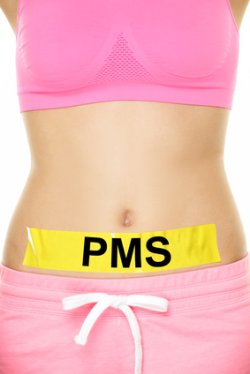How to avoid PMS and menstrual pain
 PMS (Premenstrual Syndrome) entails a long list of symptoms such as headaches, mood swings, fatigue, irritability, fluid retention, and a strong craving for sweets and stimulants - and even a desire for divorce.
PMS (Premenstrual Syndrome) entails a long list of symptoms such as headaches, mood swings, fatigue, irritability, fluid retention, and a strong craving for sweets and stimulants - and even a desire for divorce.
A woman's menstrual cycle clearly shows what a huge impact hormone levels have on her mood and general well-being. Unhealthy living and deficiencies of essential nutrients add to the problem by upsetting the delicate hormonal system. The good news is that this is something you can easily correct by means of dietary changes and the use of specific food supplements.
An estimated 30 per cent or so of European women suffer from PMS (Premenstrual Syndrome) to a greater or lesser extent. Symptoms typically vary right after pregnancy and childbirth and in the years just before menopause.
PMS only occurs after ovulation, and the duration and severity varies from woman to woman. Many women resort to painkillers and birth control pills for relief, but these medications are associated with serious side effects. It is therefore better to opt for natural solutions that address the underlying hormonal imbalances.
Low progesterone is a common cause of PMS
Progesterone is primarily produced in the ovaries in the period between ovulation and menstruation. This hormone helps to sustain pregnancy. Partial lack of progesterone is a common cause of PMS and reduced fertility after the age of 35 years, even if a women has regular menstrual periods.
Low progesterone levels can also cause mood swings, insomnia, fragile bones (osteoporosis), inflammation, and various other symptoms, in part because progesterone is a biological precursor of estrogen, other sex hormones, and stress hormones in the so-called steroid chain.
General recommendations regarding diet
It is generally advised to stick with a healthy, varied diet and a healthy lifestyle as such. Nonetheless, factors like stress, nutrient-depleted soil, and poor diets that are devoid of fish may lead to deficiencies of one or several essential nutrients. This is something one can compensate for by taking relevant supplements. Moreover, it is a good idea to limit your intake of alcohol, as the liver is heavily involved in the hormonal balance by breaking down and reconstructing hormones.
Chronic stress disturbs all sex and stress hormones
Chronic stress increases levels of the stress hormone cortisol that cashes in on the nutrient stores of our tissues and is broken down afterwards. Figuratively speaking, it is like making constant bank withdrawals, only with nutrients instead of money. However, as the amount of progesterone is limited, and because progesterone is a precursor of all sex hormones, chronic stress has a huge impact on the entire hormonal balance and may also contribute to PMS and menstrual pain.
PMS and frayed nerves
Chronic stress is a huge burden to our nervous system. It also increases the risk of PMS symptoms such as irritability, despair, tearfulness, poor concentration, and insomnia. The body consumes generous amounts of vitamin C, B vitamins, and magnesium in connection with different types of stress to support the adrenal glands and the hormone system.
Fish oils and vitamin B12 relieve menstrual pain
A Danish researcher named Bente Deutch from Århus University in Denmark conducted a study of 78 young women with dysmenorrhea (menstrual discomfort). Her study showed that supplementation with fish oil (as free fatty acids) combined with vitamin B12 effectively reduces menstrual pain and other symptoms. According to the researcher, the nutrients work by regulating some hormone-like substances called prostaglandins.
PMS and a delicate blood sugar balance
Many people suffer from headaches, fatigue, concentration difficulty, and various other symptoms that are caused by low blood sugar levels. In such cases, people often have a strong craving for sweets, white bread, snacks, or stimulants. When people have sensitive blood sugar it is extremely important to get enough protein and healthy fats (essential fatty acids) with all main meals, as this helps sustain prolonged satiety and stable blood sugar. Supplementing with organic chromium yeast also contributes to better functioning of insulin. This improves the uptake of glucose in cells so they can produce more energy
Fluid retention and weight gain
Disturbances in the fluid balance may cause bloating in the abdomen, legs, and fingers, and weight gain. In such cases it is important to limit your intake of sodium and licorice that are known to retain fluid. In case you were not aware of it, there are large amounts of sodium in cheese, commercial bread, and ready meals. High-dosed B vitamin supplements and magnesium generally have a positive effect on the fluid balance.
Painkillers and side effectsUsing pain-relieving medication against menstrual pain and headaches increases the risk of sensitive intestinal mucosa, poor digestion, food intolerance, bleeding stomach ulcers, heart disease, and blood clots (thrombosis). |
Birth control pills and side effectsMany women get birth control pills for their menstrual pain but this type of medication may cause side effects such as nausea, headache, weight gain, depression, hair loss, vaginal thrush, and increased risk of breast cancer and cervical cancer. |
References:
Pernille Lund: Sund og smuk. Ny Videnskab 2016
Bente Deutch et al: Menstrual discomfort in Danish women reduced by dietary supplements of omega-3 PUFA and B12 (fish oil or seal oil) Nutrition Research
Search for more information...
- Created on .








